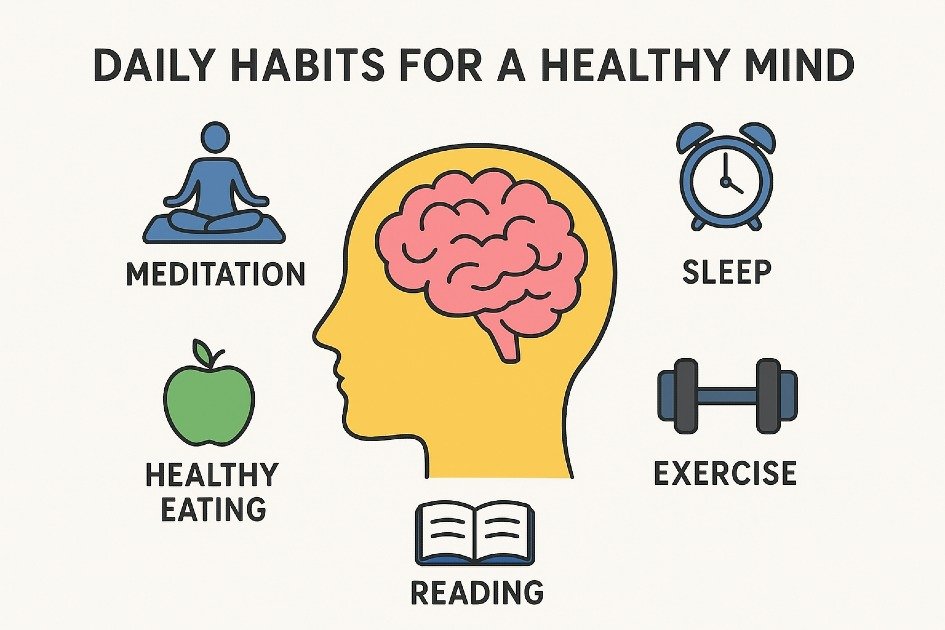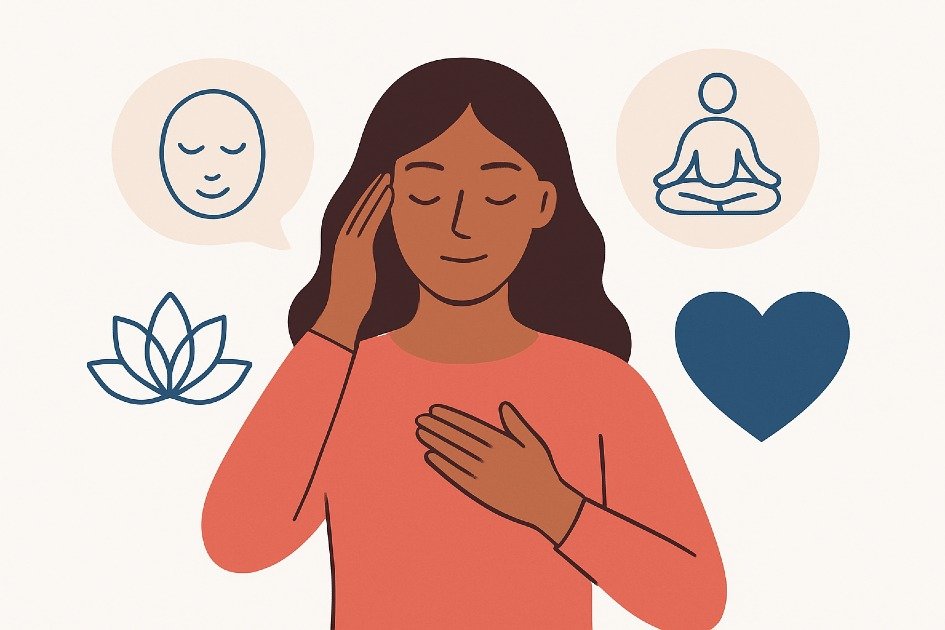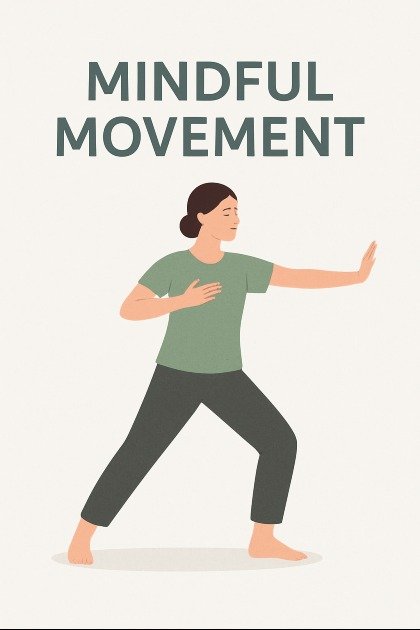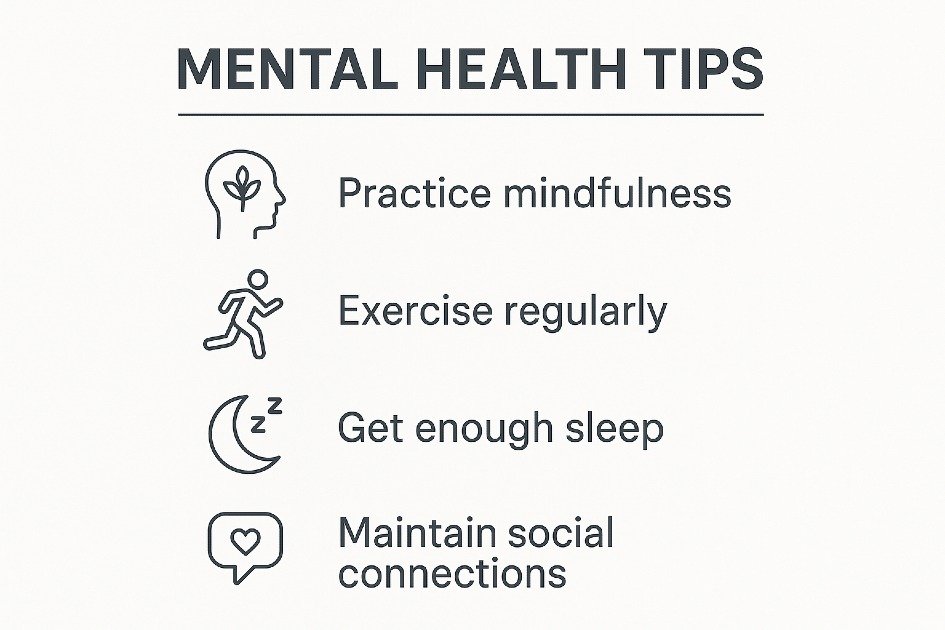Have you ever wondered how a few simple mental health tips could transform the way you feel, think, and navigate stress starting today?
Many people think they must make substantial changes to feel better, but mental strength often starts with small, simple habits that build balance and emotional resilience.
Harvard Health emphasizes the significance of early intervention in mental health to prevent worsening or permanent changes in mood and mental health.
They go beyond superficial fixes, focusing on sustainable choices like nourishing the body with mood-boosting foods and strengthening relationships with loved ones.
Caring for mental well-being should never be optional. Starting today with simple tips can create a foundation for resilience, joy, and a calmer mind.
This guide outline insights to enhance mental well-being through various practices, promoting a harmonious and grounded sense of self.

The Power of Daily Habits for a Healthier Mind
Mental health thrives when nurtured daily. Consistent habits can transform stress into clarity, anxiety into calm, and ordinary days into meaningful ones. These practical strategies promote mental wellness by incorporating small, impactful steps.
Start Your Day with a Positive Morning Routine
Why it matters:
A structured morning routine can boost focus, mood, and resilience against daily stressors, preventing rushed start-ups that trigger stress hormones and overwhelm the entire day.
How to do it:
- Wake up 15 minutes early. Use this time to stretch or sit quietly.
- Each morning, write three things you are thankful for or three goals you want to achieve.
- Start your day with a glass of water and a deep breath.
When I practice even one of these steps each morning, my mindset feels lighter and more focused. I also use a mental wellness journal to keep my routine on track.
Create Small Rituals That Boost Your Mood
Why it matters:
Rituals provide predictability, reduce anxiety, signal focus, relax, and reset, and strengthen emotional resilience over time through small daily rituals.
How to do it:
- Drink your morning tea or coffee slowly. Notice the taste, the smell, and the warmth in your hands.
- Spend 5 minutes before sleep thinking about what went well and what made you smile today.
- Pause for 2–3 minutes to stretch, breathe deeply, or step outside. These short breaks refresh your mind and boost focus.
I follow small daily rituals that quietly change my life.
Practice Gratitude to Shift Your Perspective
Why it matters:
Gratitude improves brain focus, reduces stress, enhances emotional well-being, promotes resilience, improves sleep, and strengthens social connections through consistent practice.
How to do it:
- Each day, list 3–5 things you appreciate, like a sunny morning or a friend’s smile.
- As you walk, notice things that make you happy, birds singing, sunlight on your face, or kind people you meet.
- Send a thank-you note or message each day. Recognizing others builds strong connections and spreads positivity.
I boost my gratitude daily by using guided journals that fit easily into my routine.

Stress Management Strategies That Actually Work
Managing stress involves taking control of it, not eliminating it completely. Practical strategies can help you feel calmer, sharper, and more balanced.
Learn Simple Breathing Exercises to Calm Anxiety
Why it matters:
Breathing, crucial for the nervous system, can trigger stress responses, while slowing it to signal the brain to relax, improving focus, reducing tension, and safeguarding mental energy.
How to do it:
- Sit or lie down in a comfortable position
- Inhale slowly through your nose as you count to four.
- Take a deep breath and hold it for four counts.
- Breathe out slowly through your mouth, counting to six.
- Continue for 3–5 minutes, feeling your heartbeat slow and steady.
I pair my breathing exercises with soft music or nature sounds. Platforms like Online Therapy.com guides me for deeper relaxation.
Use Journaling as a Safe Outlet for Your Thoughts
Why it matters:
Journaling aids in problem-solving, emotional processing, and mental load reduction by decluttering the mind and providing perspective.
How to do it:
- Spend 10–15 minutes each day, either in the morning or before sleep, for best results.
- Write openly. Let your ideas flow without holding back.
- Notice what went well or what you learned, instead of only seeing problems.
- Spot your common stress triggers and think of ways to manage them.
I keep a sleek notebook with me. Guided prompts help me reflect quickly and stay organized.
Incorporate Relaxation Techniques into Busy Days
Why it matters:
Mini relaxation practices can help manage daily stressors like emails, deadlines, and traffic, preventing them from overwhelming your mental wellbeing.
How to do it:
- Every 60–90 minutes, take a 5-minute break. Stand, stretch, or walk to boost energy and focus.
- Practice progressive muscle relaxation by squeezing a muscle for 5 seconds, then let it go.
- Drink herbal teas like chamomile or peppermint to help your mind and body relax.
- Visualize calm: picture a peaceful place to clear your mind fast.
I add stretching naturally to these habits while my coffee brews.
Practice Mindful Movement
Why it matters:
Movement not only improves physical health but also enhances mental health by releasing endorphins, enhancing brain stress processing, and promoting emotional resilience through mindful movement.
How to do it:
- Do gentle yoga in the morning or evening to boost calm and energy.
- Step outside and walk, paying attention to your breath, posture, and the world around you.
- Move to music or listen to podcasts while exercising to make workouts fun and engaging.
- Begin with just 10 minutes a day, small steps still make a significant difference.
Doing a little each day keeps my stress under control, using a yoga mat or following a guided video.
Harness the Power of Nature
Why it matters:
Natural environments lower stress hormone cortisol, boost mood, and provide mental stimulation, improving clarity and emotional stability.
How to do it:
- Take a slow walk in a park or garden. Notice the colors, listen to the birds, and enjoy the scents of flowers and trees.
- Stand barefoot on grass to connect with the earth and calm your mind.
- Add indoor plants or a small balcony garden to freshen your space and boost your mood.
- Step outside for short breaks, even just 10 minutes, to refresh your mind and boost focus.
I step outside and breathe deeply, letting nature double my calm.
Build a Stress-Relief Toolkit
Why it matters:
A personalized toolkit provides multiple strategies to manage stress, ensuring mental and emotional reserves are protected before it escalates.
How to do it:
- Listen to music, read a book, enjoy soothing scents, or do gentle stretches.
- Keep calming items like herbal tea, essential oils, or a pocket journal.
- Switch your strategies to match your daily energy and schedule.
- Track results—see which methods ease tension quickest.
I keep a digital toolkit on my phone with apps, calming playlists, and guided exercises I can use anywhere to stay focused and relaxed.

Nourishing Your Body to Support Your Mind
Mental health is linked to our diet and body habits. Conscious choices in nutrition support mental wellbeing by providing energy, focus, and resilience, resulting in a calmer, more balanced mind.
Eat Brain-Friendly Foods That Fuel Mental Clarity
Why it matters:
Consuming 20% of daily energy, a diet rich in essential nutrients are crucial for cognitive performance, memory, mood, and mental clarity, preventing mental fatigue and emotional instability.
How to do it:
- Eat omega-3 foods like salmon, walnuts, and chia seeds to boost brain health and fight inflammation.
- Eat colorful foods like blueberries, spinach, and bell peppers to load up on antioxidants that keep your brain cells safe.
- Incorporate whole grains like quinoa, oats, and brown rice to keep blood sugar steady and improve focus.
- Eat lean proteins like chicken, tofu, and eggs. They give your body amino acids that help make brain chemicals to balance mood.
- Try herbs and spices like turmeric and rosemary to clear brain fog and fight stress from free radicals.
I started trading chips and cookies for nuts and fruit. Within weeks, I felt more focused, and my mood stayed steady.
Stay Hydrated to Keep Energy and Focus Sharp
Why it matters:
Mild dehydration can decrease concentration, memory retention, and mental alertness. Water is essential for nutrient transport, neurotransmitter production, and waste removal, enhancing brain function.
How to do it:
- Drink 8–10 glasses of water each day and add more if you are active or in hot weather.
- Drink a glass of water first thing in the morning before coffee or breakfast. It wakes up your body and boosts focus for the day.
- Add slices of fruit or herbs to your water for natural flavor without extra sugar.
- Use a hydration app or a reusable bottle to track your water and stay on target.
- Cut back on sodas and too much coffee, and drink plenty of water instead
I have learned that when a headache hits or I feel that afternoon crash, the first thing I do is drink water. Most of the time, it is all my body needs to clear the fog and bring my energy back.
Prioritize Quality Sleep as a Mental Reset
Why it matters:
Sleep is crucial for mental maintenance, allowing the brain to clear toxins, consolidate memories, and regulate mood, while poor sleep can lead to anxiety, irritability, and impaired decision-making.
How to do it:
- Go to bed and wake up at the same time every day. This trains your body clock, helps you fall asleep faster, and keeps your energy steady.
- Do a simple bedtime habit, like reading or light stretching, to tell your brain it is time to relax and sleep.
- Avoid screens 1–2 hours before bedtime. Blue light from phones and TVs blocks melatonin, the sleep hormone your body needs for deep rest.
- Keep your bedroom cool, dark, and quiet to help your body rest deeply every night.
- Try mindful breathing or a short meditation before bed to quiet your mind and improve mental recovery.
After just one good night of sleep, I think more clearly, stay calmer, and manage my emotions better.
Practical Daily Rituals to Support Mental Nutrition
Why it matters:
Consistency in daily rituals promotes long-term mental resilience by reinforcing healthy eating, hydration, and sleep, thereby laying a solid foundation for mental health amidst stress and fatigue.
How to do it:
- Plan and prep healthy meals ahead to skip quick, unhealthy choices.
- Place a water bottle where you can see it to drink more often and stay hydrated.
- Keep a daily journal of your sleep and mood to spot patterns and improve your routine.
- Practice mindful eating: chew slowly and enjoy each flavor to aid digestion and feel more satisfied.
- Eat seasonal foods to get different nutrients and make meals more exciting.
I started small—I swap one processed snack for a brain-boosting option and slowly build the habit. I also take supplements like Omega-3, magnesium, or vitamin D to support my mental health.

Movement as Medicine for the Mind
Movement not only improves physical fitness but also enhances mental health by releasing endorphins, reducing stress, anxiety, and depression, and improving focus, memory, and emotional resilience.
Try Gentle Exercises Like Yoga and Stretching
Why it matters:
Yoga and stretching not only enhance flexibility but also calm the nervous system, reduce stress hormones, improve brain blood flow, reducing tension, and sharpening mental clarity.
How to do it:
- Stretch for 5–10 minutes each morning to wake up your muscles and improve flexibility.
- Use beginner yoga videos or meditation platform online to start your practice safely and easily.
- Breathe deeply during stretches—inhale calm, exhale stress.
I stand at my desk to stretch, and it instantly clears my mind during a hectic day.
Go Outdoors and Walk for Natural Stress Relief
Why it matters:
Outdoor walking enhances mood and reduces mental fatigue by promoting vitamin D levels, which are essential neurotransmitters linked to happiness.
How to do it:
- Try walking briskly for 20–30 minutes every day to boost heart health, energy, and mood.
- Take routes with trees, water, or flowers to awaken your senses and boost well-being.
- Walk mindfully: feel each step, match your breath to your pace, and notice what is around you.
- Choose comfortable walking shoes to keep your feet pain-free and energized
I listen to a podcast or calming playlist while I walk, keeping my mind sharp as my body moves.
Explore Fun Physical Activities That Lift Your Spirits
Why it matters:
Engaging in enjoyable movement like dancing, swimming, or cycling boosts dopamine and serotonin production, improves focus, and strengthens stress resilience, promoting mental health when it feels like play.
How to do it:
- Pick an activity that makes you feel excited, dance, play a team sport, or try jump rope.
- Put your sessions on the calendar. Doing them regularly matters more than doing them hard.
- Bring friends or family along, staying social boosts your mental health
- Use apps or fitness trackers to follow your progress and stay motivated.
I focus on having fun, not on getting it perfect. When I enjoy what I do, my mind feels stronger and lighter.
Incorporate Movement Breaks into Your Daily Routine
Why it matters:
Sitting for extended periods can lead to mental fatigue and stress, while short, frequent breaks with movement can enhance focus, memory, and overall mental clarity.
How to do it:
- Every hour, stand up and move for 2–5 minutes—stretch, walk, or just shift your body to stay active and healthy.
- Take the stairs instead of the elevator to boost heart health, burn calories, and strengthen muscles.
- Do quick desk exercises, roll your shoulders, lift your calves, or twist in your chair to stay active.
- Use an ergonomic chair or a standing desk to keep your posture healthy.
I keep my body and mind energized by moving a little throughout the day.
Combine Movement with Mindfulness Practices
Why it matters:
Mindful movement, such as Tai Chi or walking meditation, combines mental awareness with physical activity, reducing anxiety, improving attention, and enhancing emotional regulation.
How to do it:
- Pay attention to your breath and how your body moves, feeling each sensation clearly
- Move slowly and carefully, paying attention to how your body feels and loosen.
- Begin with 10 minutes and slowly add more time as you go.
- Follow guided meditation or Tai Chi sessions to reduce stress and boost focus.
Yoga or walking outside boosts my mood, strengthens my brain, and builds my resilience. Over time, keeping this routine helps me stay mentally well, with tools like yoga mats and fitness trackers making it easier.

Building Strong Social Connections
Connecting with others is crucial for mental health, as relationships impact mood, resilience, and overall wellbeing. Taking small steps can transform social life and mind.
Reach Out and Stay Connected with Loved Ones
Why it matters:
Maintaining social connections enhances support, reduces loneliness, and fosters emotional safety, potentially reducing stress and enhancing mental resilience.
How to do it:
- A short call or text keeps relationships strong without taking much time.
- Talk about a real win or challenge, not just a simple message.
- Call, video chat, or meet in person to keep relationships lively.
- Focus completely on others when they speak. It builds trust and stronger connections.
I love sending a funny meme or congratulating a friend—it sparks small waves of happiness that spread through my circle.
Join Supportive Communities Online or Offline
Why it matters:
Community involvement promotes mental health by providing a sense of belonging, validation of feelings, and practical advice in a supportive environment.
How to do it:
- Join a book club, fitness class, or hobby group to meet like-minded people.
- Use Reddit or Facebook groups to safely meet people from around the world
- Visit community centers, take workshops, or volunteer to meet people and learn new skills.
- Ask questions, share your experiences, and cheer for others’ successes.
I rely on my community when I feel alone. It lifts me up and gives me support I cannot always find on my own.
Set Healthy Boundaries in Your Relationships
Why it matters:
Setting boundaries is crucial for maintaining positive interactions and protecting mental space, as it prevents emotional burnout, reduces stress, and promotes sustainable relationships.
How to do it:
- Notice which social situations lift you up and which wear you out.
- Say what you need, like taking time for yourself or saying no to plans.
- Strong relationships grow when respect is shared.
- Keep friends who lift you up and step back from those who drain your energy.
I set boundaries not to push people away, but to protect my peace and strengthen my relationships.
Foster Deep, Meaningful Conversations
Why it matters:
Deep conversations foster trust, emotional safety, empathy, mental clarity, and can reduce anxiety and depression symptoms through shared understanding and empathy.
How to do it:
- Ask questions that make people think. Invite them to share their ideas, feelings, and dreams.
- Being vulnerable builds trust and inspires others to do the same.
- Repeat and confirm what others say to show you understand them.
- Plan moments to share feelings and listen deeply, not just quick updates.
I notice my mind feels stronger and calmer when I have just one deep conversation each week.
Celebrate and Appreciate Your Social Network
Why this matters:
Recognizing and appreciating others strengthens relationships, promoting emotional stability and mental health, and fosters trust, loyalty, and mutual support.
How to do it:
- Simple words like ‘I value your help’ make relationships stronger.
- Honoring birthdays, achievements, and personal wins boost happiness and motivation.
- Send a card or share a helpful resource to show care.
- Celebrate small wins together to keep your group positive and motivated.
I show appreciation often because it strengthens the bonds I have with friends and family, keeping our relationships strong over time.
Recap: Take the First Step Toward a Healthier Mind Today
Nurturing mental well-being is achievable through daily actions like mindful breathing, nourishing meals, and nature walks.
Harvard Health suggests that regular physical activity can be as effective as antidepressants in some cases, enhancing mood, memory, and reducing stress.
Consistency, awareness, and courage are key to a healthier mental life. Simple daily practices can reduce stress, sharpen focus, and elevate quality of life.
Even subtle shifts like limiting social media, practicing gratitude, or journaling can enhance mental clarity.
Prioritizing mental wellness is essential for strengthening resilience, sharpening focus, and nurturing inner equilibrium. Share your journey and invest in your mental health today to experience lasting vitality.
Frequently Asked Questions
What are the fastest ways to improve mental health?
Small, consistent interventions like mindfulness exercises, deep breathing techniques, and morning rituals can significantly improve mental health, while supplements like adaptogens and omega-3 fatty acids support cognitive function.
How can I calm my mind when I feel overwhelmed?
Grounding techniques, such as sensory-focused mindfulness, meditation, and mental wellness tools, can effectively reduce anxiety and reorient the mind, while externalizing thoughts for mental clarity.
What role does diet really play in mental health?
Nutrition directly impacts mental function, with brain-friendly foods like leafy greens, fatty fish, and dark berries enhancing agility and supplementing nutritional gaps in modern diets.
Can small daily changes make a significant difference?
Habits like regular exercise, regular water intake, and gratitude practice can enhance mental resilience and emotional balance over time.
When should I consider talking to a therapist?
Delay professional intervention for persistent stress, emotional exhaustion, insomnia, irritability, or difficulty concentrating. Online therapy platforms offer flexible, confidential sessions, promoting mental wellness.
How do I build a sustainable mental health routine?
A sustainable mental health routine involves proactive and reactive strategies like exercise, nutrition, and meditation, with tools like habit trackers and guided apps for consistency.
Can mental health supplements really make a difference?
Supplements like ashwagandha, rhodiola, and nootropic blends can enhance mental health by reducing stress and promoting cognitive vitality, requiring a holistic approach with lifestyle interventions.
How do I manage social pressures that affect my mental health?
Social stressors can impact mental equilibrium, so strategies like setting boundaries, assertive communication, and maintaining social circle can reduce strain and enhance resilience.
Is mindfulness really that effective for mental wellness?
Mindfulness is a mental technique that enhances attention, reduces rumination, and promotes emotional balance, with daily sessions enhancing clarity and reducing stress levels.
What is the best way to track my mental health progress?
Tracking mental health involves using qualitative and quantitative measures like journaling, habit-tracking apps, and reflective checkpoints to identify patterns and triggers, ensuring a dynamic, sustainable wellness journey.

